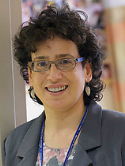Excellent leukemia control after second hematopoietic cell transplants with unrelated cord blood grafts for post-transplant relapse in pediatric patients Journal Article
| Authors: | Troullioud Lucas, A. G.; Boelens, J. J.; Prockop, S. E.; Curran, K. J.; Bresters, D.; Kollen, W.; Versluys, B.; Bierings, M. B.; Archer, A.; Davis, E.; Klein, E.; Kernan, N. A.; Lindemans, C. A.; Scaradavou, A. |
| Article Title: | Excellent leukemia control after second hematopoietic cell transplants with unrelated cord blood grafts for post-transplant relapse in pediatric patients |
| Abstract: | Background: Patients with leukemia relapse after allogeneic hematopoietic cell transplant (HCT) have poor survival due to toxicity and disease progression. A second HCT often offers the only curative treatment. Methods: We retrospectively reviewed our bi-institutional experience (MSKCC-USA; Utrecht-NL) with unrelated cord blood transplantation (CBT) for treatment of post-transplant relapse. Overall survival (OS) and event-free survival (EFS) were evaluated using the Kaplan-Meier method, treatment-related mortality (TRM) and relapse were evaluated using the competing risk method by Fine-Gray. Results: Twenty-six patients age < 21 years received a second (n=24) or third (n=2) HCT with CB grafts during the period 2009-2021. Median age at first HCT (HCT1) was 11.5 (range: 0.9-17.7) years and all patients received myeloablative cytoreduction. Median time from HCT1 to relapse was 12.8 (range 5.5-189) months. At CBT, median patient age was 13.5 (range 1.4-19.1) years. Diagnoses were AML: 13; ALL: 4, MDS: 5, JMML: 2; CML: 1; mixed phenotype acute leukemia: 1. Sixteen patients (62%) were in advanced stage, either CR>2 or with active disease. Median time from HCT1 to CBT was 22.2 (range 7-63.2) months. All patients engrafted after CBT. Thirteen patients developed acute GvHD; 7 had grade III or IV. With a median survivor follow-up of 46.6 (range 17.4-155) months, 3-year OS was 69.2% (95% CI 53.6-89.5%) and 3-year EFS was 64.9% (95% CI 48.8-86.4%). Eight patients died, 3 of AML relapse and 5 due to toxicity (respiratory failure [n=4], GvHD [n=1]) at a median time of 7.7 (range 5.9-14.4) months after CBT. Cumulative incidence of TRM at 3 years was 19.2% (95% CI 4.1-34.4%). Notably, all TRM events occurred in patients transplanted up to 2015; no toxicity-related deaths were seen in the 16 patients who received CBT after 2015. Cumulative incidence of relapse was 15.9% (95% CI 1.6-30.2%) at 3 years, remarkably low for these very high-risk patients. Conclusions: Survival was very encouraging following CB transplants in pediatric patients with recurrent leukemia after first HCT, and TRM has been low over the last decade. CBT needs to be strongly considered as a relatively safe salvage therapy option for post-transplant relapse. Copyright © 2023 Troullioud Lucas, Boelens, Prockop, Curran, Bresters, Kollen, Versluys, Bierings, Archer, Davis, Klein, Kernan, Lindemans and Scaradavou. |
| Keywords: | adolescent; adult; clinical article; event free survival; leukemia; young adult; overall survival; busulfan; fludarabine; mortality; salvage therapy; cancer growth; outcome assessment; follow up; phenotype; neutrophil count; bone marrow; cohort analysis; relapse; hematopoietic stem cell transplantation; chronic myeloid leukemia; retrospective study; acute lymphoblastic leukemia; high risk patient; survivor; risk assessment; acute graft versus host disease; acute leukemia; cord blood stem cell transplantation; graft failure; myelodysplastic syndrome; whole body radiation; allogeneic hematopoietic stem cell transplantation; kaplan meier method; clofarabine; platelet count; respiratory failure; cumulative incidence; juvenile myelomonocytic leukemia; acute myeloid leukemia; human; male; female; article; cord blood transplant; second transplant; pediatric patient; treatment related mortality |
| Journal Title: | Frontiers in Oncology |
| Volume: | 13 |
| ISSN: | 2234-943X |
| Publisher: | Frontiers Media S.A. |
| Date Published: | 2023-01-01 |
| Start Page: | 1221782 |
| Language: | English |
| DOI: | 10.3389/fonc.2023.1221782 |
| PROVIDER: | scopus |
| PMCID: | PMC10465242 |
| PUBMED: | 37649924 |
| DOI/URL: | |
| Notes: | The MSK Cancer Center Support Grant (P30 CA008748) is acknowledged in the PubMed record and PDF. Corresponding MSK author is Alexandre G. Troullioud Lucas -- Source: Scopus |
Altmetric
Citation Impact
BMJ Impact Analytics
MSK Authors
Related MSK Work











